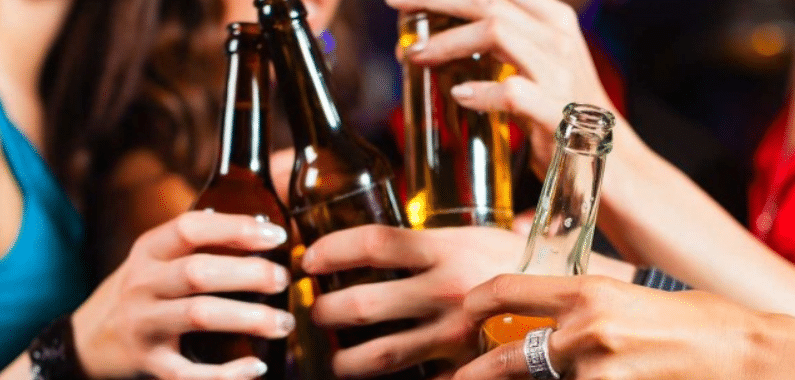 Guest Blog by Dr. Susan Delaney, Director of Adolescent Services at The Council on Recovery’s Center for Recovering Families
Guest Blog by Dr. Susan Delaney, Director of Adolescent Services at The Council on Recovery’s Center for Recovering Families
The Data Behind the Teen Alcohol Problem
Despite the overwhelming media coverage of the opioid epidemic and the drug addiction crisis, most parents are surprised to learn that alcohol is currently the drug of choice among U.S. teens aged 12 -18 years. Once kids enter high school the usage rates increase dramatically: In a recent study, 75% of adolescents report having had an alcoholic drink by the 12th grade.

More than one-quarter of those said they had their first drink before age 13. A 2018 University of Michigan study indicated that 41% of teens reported alcohol use in the last 30 days and, of most concern, 3% reported daily use.
The data gets worse: Two measures of heavy alcohol use – that is having been drunk in the past 30 days and binge drinking (having had five or more drinks on one occasion) — are on the rise. In 2017, binge drinking was reported by 4% of 8th graders, 10%, of 10th graders, and 17% of 12 graders. The Substance Abuse and Mental Health Services Administration (SAMHSA) reported the percentage of all adolescents aged 12 to 17 who were current alcohol users was 9.2 percent or 2.3 million teens in 2016. About 1.2 million adolescents aged 12 to 17 were binge alcohol users, a shocking 1 in 20 adolescents.
A Problem That May Begin at Home
A disturbing, but undeniable, fact is that teenage alcohol use usually begins at home. According to the National Association for Children of Alcoholics, 76 million Americans — roughly 43 percent of the U.S. adult population — have been exposed to alcoholism in the family. There are an estimated 26.8 million children of alcoholics (COAs) in the United States and preliminary research suggests that more than 11 million of those are under the age of 18. Children of alcoholics are four times more likely than non-COAs to develop alcoholism.
Why Teens Drink
Teens are particularly vulnerable to alcohol use. Coping with the stress of fitting in and challenging transitions, such as going from middle school to high school, moving, or dealing with the effects of divorce, might influence a teen to drink. Alcohol’s saturation of popular culture and social media have created virtually irresistible attractions to drinking for teenagers, if only to experiment with it, yet much of what kids experience after trying it can influence continuing use, misuse, and abuse of alcohol. Most difficult of all, teenagers usually have trouble understanding that their actions can have harmful, or even fatal, consequences.
There are a multitude of risk factors associated with teenage alcohol use that are both complex and pervasive. These include:
- Family problems, such as conflict or parental alcohol abuse
- Childhood abuse or other major trauma
- Behavioral, school or untreated mental health issues
- Friendships with teens who drink or use other substance
The (Potentially) Terrifying Outcome
Parents concerned about their teenagers’ use of alcohol should be aware of what can happen when that use turns to misuse or abuse:
- Alcohol-related fatalities: Alcohol-related accidents are a leading cause of teen deaths. Teen drownings, suicides and murders also have been linked with alcohol use.
- Sexual activity: Teens who drink tend to become sexually active earlier and have sex more often than do teens who don’t drink. Teens who drink are also more likely to have unprotected sex than are teens who don’t drink.
- School problems: Teens who drink tend to have more academic and conduct problems than do teens who don’t drink.
- Alcoholism: People who begin drinking as young teens are more likely to develop addiction to alcohol than are people who wait until they’re adults to drink.
- Violent crime: Teens who drink are more likely to be hurt in a violent crime, such as rape, assault or robbery.
Talking With Your Teen About Underage Drinking
You might be unsure of what to say to your teen about underage drinking, and your teen might try to dodge the conversation. To start the discussion, choose a time when you and your teen are relaxed. Don’t worry about covering everything. If you talk often, you might have a greater impact on your teen than if you only talk once.
When you talk with your teen about alcohol use, here are some useful “talking points” for an effective conversation:
- Ask your teen what they think and how they feel about alcohol.
- Stop the myths: Teens often think that drinking makes them popular and cool. Explain that alcohol can make you feel high but it’s a depressant that can also cause sadness and anger.
- Discuss reasons not to drink: Explain the risks of alcohol, and appeal to your teen’s self-respect. If you have a family history of alcoholism or drinking problems, then make sure to tell them. Explain that your teen might be more vulnerable to developing a drinking problem-The Council can help with information about alcohol and the developing brain.
- Plan ways to handle peer pressure: Brainstorm with your teen about how to respond to when someone offers them alcohol. It might be as simple as saying, “No thanks,” “Do you have any soda?” Or even, “I can’t drink. My parents breathalyze me when I get home.”
- Be prepared for questions: Your teen might ask if you drank alcohol when you were underage. If you chose to drink, then share an example of a negative consequence of your drinking.
Steps Parents Can Take to Stop Teen Drinking Before It Becomes a Problem
To be sure, not all alcohol use turns into misuse or abuse, but most parents would rather stop teen drinking before it becomes a problem. Here are some steps you can take:
- Support your teen. Help your teen build the self-esteem he or she needs to stand up to peer pressure — and live up to your expectations.
- Know your teen’s activities. Pay attention to your teen’s plans and whereabouts. Encourage participation in supervised after-school and weekend activities.
- Establish rules and consequences. Rules might include leaving parties where alcohol is served and not riding in a car with a driver who’s been drinking. Agree on the consequences of breaking the rules ahead of time and enforce them consistently. Also, make sure your teen knows the drinking laws.
- Set an example. If you drink, do so only in moderation and explain to your teen why it’s OK for adults to drink responsibly. Describe the rules you follow, such as not drinking and driving. Don’t serve alcohol to anyone who’s underage.
- Encourage healthy friendships. If your teen’s friends drink, your teen is more likely to drink, too. Get to know your teen’s friends and their parents.
Getting Help When It’s Needed
It’s never too soon to start talking to your teen about underage alcohol use. By talking now, you’ll help give your teen the guidance and support necessary to make good choices.
However, if you suspect that your teen has been drinking, talk to him or her. Enforce the consequences you’ve established. If you think your teen might have a drinking problem, you can always contact your teen’s doctor or a counselor or other health care provider who specializes in alcohol problems. Teens who have alcohol problems aren’t likely to realize it — or seek help — on their own.
Start at The Council on Recovery
Since 1946, The Council on Recovery has been Houston’s leading non-profit provider of prevention, education, treatment, and recovery services for individuals and families who are adversely affected by alcoholism, drug abuse, other addictions, and co-occurring mental health disorders. Our Adolescent Services programs at our Center for Recovering Families are designed to help teenagers and their parents face the problems of alcohol and drug abuse with effective outpatient counseling services and our Mindful Choices high-risk behavior classes. By working with the teenager and their parents, we help heal the entire family.
